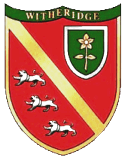

|
Memories noted down on 12th May 1999 Betty's grandfather was Samuel James Way, referred to in these notes as James. He came to Witheridge from Morchard Bishop before the year 1878, when he is mentioned in the Devon Directory entry for Witheridge as a glazier. By 1880, he had established himself as glazier, builder and undertaker in the house at the right hand end of the row running from the churchyard. He had not been there long before a fire broke out in this block of buildings and completely destroyed it. James Way rebuilt the block in the style that is seen today in 1999. He made sure that his house, nearest the Vicarage wall, was designed to be as convenient a house for a builder as possible. For example, there was no garden at the back, but a cobbled area fronted a store, with a loft above it where coffin boards, deals and ladders were kept, the ladders on special hangers so that they could be let down to the ground when needed. The workshop was on this floor too. Downstairs in the store were roofing slates, a handcart for local jobs, and a hand turned grindstone, which the village butchers, used for sharpening their knives. Betty (BA) remembers her grandfather's white pony "Polly". Polly was kept in the field called Upper Lime Close, now known as Parish Hall Field, where there was a shed for the cart. This field became known as James Way's Field. Fred Bowden, Percy Bowden's father, was James's mason, and one of his jobs was to turn powdered lime into putty lime by adding water to a cauldron kept at the back of the house. The resulting paste was shovelled out and sold by weight. People would come and buy putty lime for whitewashing their walls. James Way had another use for it. Twice a year he would mix up a certain proportion of lime and water and make his family drink it, it was said to purify the blood. Betty recalls that the flavour was horrible. Also outside was a pit for sea sand, used for mortar. Upstairs at the back of the house the workshop also had two long workbenches, a full set of planes and other carpentry tools, and a container for glass, which would be cut by a diamond. Betty still has her father's glass-cutting diamond. Above the workshop a kind of garret ran from the back right through to the front of the house. Here paint was kept, wood mouldings for doors and picture frames, and the pony food, for which a wooden pony basket was used. Betty recalls the enormous deal wardrobe that James made for himself and his wife. Her grandfather was very fond of attending sales. At these it was his habit to wait until the end, and then buy mixed lots of what was left and bring them home. He had a special skill at mending leather pump suckers, when they became worn and no longer airtight. He was a skilled saw sharpener. He employed Arthur Brent as a carpenter; Arthurs mother was a Cockney, with a fund of Cockney stories. James was a great Congregational Chapel man, and ensured that is granddaughter attended not only the Chapel, but also the Chapel School ("British School"), which he himself had built in 1898. His jacket usually held pocketfuls of the small white Bassett's peppermints, which he used to give to adults as well as children. James's wife was a great herbalist, and sent her orders from the catalogue of the firm "Heath and Heather". James was also Witheridge Waterworks caretaker for the South Molton Rural District Council. Twice a day he would open the trapdoor of the Witheridge Reservoir (at the corner of today's Sports Field by the entrance to Lakelands) and with a long stick measure the water level. Depending on what depth he found he might have to turn off one or more of the stopcocks further down the village, so that all would get a share of the water. Water shortages were for very many years a feature of Witheridge life, and dry summers and the introduction of baths and flush toilets made things worse in the 1930s. Places like Ebrington's Row, Ditchetts, and Well Cottage in the Square had their own wells, but they were not enough. Eventually a source beyond Merryside towards Woodford was found and a pump installed. This was cared for by Betty's father, it filled the reservoir and the water tower at Merryside. Betty's father, Sam Way, worked with his father. He was in the Devon Yeomanry early in the 1914-1918 war, but transferred to the Royal Flying Corps. On his return home he brought with him his leather and fur flying helmet, which Betty enjoyed wearing. He had been stationed on the east coast, where he met his wife who came from Essex. After the war he worked for an estate agent in London. Due to his ability to turn his hand to anything he was nicknamed "Friday", from the story of Robinson Crusoe. When Betty's grandmother died, the family returned to Witheridge and the house where James still lived. In the 1939-1945 war, direction of labour was brought in, and the Way family had to leave Witheridge again. Her father was sent to Cirencester on essential Government building work. Her mother was directed to Smiths Sectric Timers near Cheltenham to work on watches for the Admiralty. At the start of the war Betty was working for Rodney Culhene at the Village Stores and Post Office, work in a food shop was at first classed as a reserved occupation, but before long she too was directed to Smiths Sectric Timers, where her work included making instruments for Halifax bombers, such as altimeters and automatic pilot equipment. The Ways were released from war work in 1946 and came home. Sam had his building work and also the South Molton RDC contract for refuse collection in Witheridge. This was done by horse and cart, and taken down and dumped near Witheridge Mill. Betty returned to Mrs Culhene's Village Stores and Post Office. In the 1950s Sam died, and a move was made to Leigh House, on the corner of the Square opposite 15 West Street. It was owned by Miss Annie Trawin, who lived on the ground floor. Betty and her mother had the two upper floors. Water for cooking and washing had to be carried up by bucket, but there was a toilet on the first floor fed from a tank filled with rainwater piped from the roof gutters. Mid Devon Gazette-19th November 1996: A presentation was made to Mrs Betty Alleyne, who has retired after 27 years service as clerk to Witheridge Parish Council at a coffee morning organised by the Twinning Association. Councillors had already presented Mrs Alleyne with a clock. Peggy Miles, a former Chairman, said that the parishioners wished to acknowledge her remarkable achievement. "She has treated everybody with utmost courtesy, and had been an exemplary and loyal servant throughout her career". She had also assisted the Women's Institute, the Tennis Club, the Drama Group, the Day Centre, the Church and Choir, St John's Fair, the British Legion Poppy Appeal, Cancer Research and Twinning. Miss Miles then presented Mrs Alleyne with a cheque for £100 and a specially designed sampler. Mrs Alleyne then thanked everyone for the surprise. Previous Last Edited 03/07/2006 Copyright © 2000-2006 Witheridge Unless otherwise indicated on the page in question, the photographic images reproduced on this site belong to the Witheridge Archives, and, as such may not be reproduced for commercial purposes without written permission. However, you are welcome to use any of the photographs belonging to the archive for personal and/or non-commercial use. Any material shown as not being owned by the archive may not be reproduced in any form without first receiving written permission from the owner of the material in question. |

